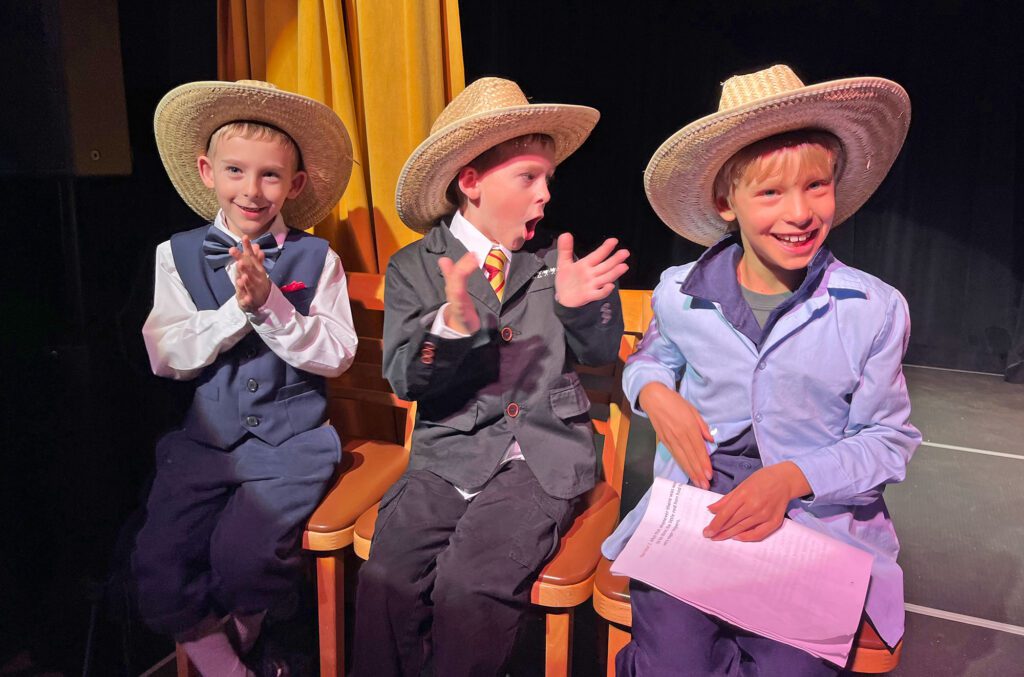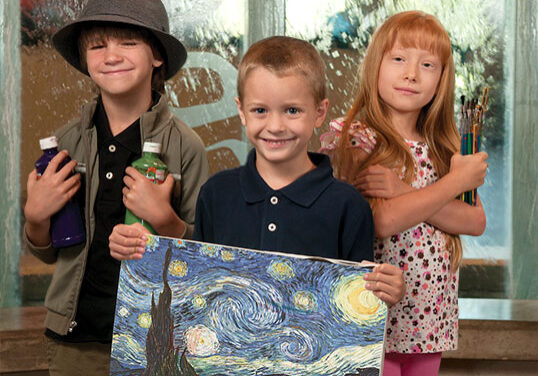If you have a child with a flair for the dramatic, who loves to sing and dance, or wants to be part of a team without playing sports, theater may be the answer you are looking for. Participating in theater can expose kids to music, arts, culture, teamwork and more. Most of the benefits of participating in theater will help them in school now as well as in the future as they enter college and/or the workforce.
Teamwork and nurturing relationships
There are so many different aspects that go into a theater production such as actors, musicians, sound technicians, set building, backstage hands, costume design, sound design, props and stage management. The entire group must work as a team to bring the production together, which is no small task. Kids will learn about teamwork in a whole new way by participating in theater. Yreka High drama teacher Eric Seiler says, ”I have known many kids to start out as actors and decide that they would rather build sets, and many backstage crew members who decide to find their way into the spotlight.”
Another great benefit is that they will most likely build some friendships along the way. Wendy James, director of Mt. Shasta Children’s Theater, owner of Shasta Studio’s School of Theatrical Dance, and executive director of the Jefferson Center for the Arts, says, “The theater experience is like being in a family. Children develop lasting relationships in theater that nurture them into adulthood.”


Yreka High School drama students star in the Fall ‘23 production of “Clue; High School Edition,” by Sandy Rustin
Confidence and self-discipline
Kids who perform in theater productions will learn confidence in public speaking, voice projection, memorization of lines and how to confidently carry themselves in front of a crowd. They further gain confidence by meeting the challenge of performing in front of others and meeting the goal of a successful production with the support of their fellow cast members and production directors.
Kids who choose to work backstage learn teamwork, self-discipline and technical skills that can lead to interesting and lucrative careers. They learn to create props, build complex structures (sets), manage crews and event flows (stage management), work with color, lighting and shapes on a grand scale, (costumes and lighting). They learn the importance of following directions and rules, and practice safety protocols; a skill set that will serve them well as they seek employment later in life. “The importance of learning transferable skills is invaluable,” says Jarrah Myles, Dance & Technical Theatre Instructor, CTE & Major Advisor and Performing Arts Production Director at Inspire School of Arts and Sciences in Chico. “At Inspire we train students at a pre-professional level so they can choose a career in theater, and the skills they learn are invaluable in any career.”


Nine-year-olds Marshall Rief, Kennedy Reif and Owen Giles rehearse as narrators for Mt. Shasta Children’s Theatre production of Chicken Little.
A space of empathy and non-judgment
“It’s important for children’s emotional health to be able to express themselves in an open space in an atmosphere of non-judgment,” Wendy says. As children examine how the characters in the production respond and react emotionally to situations, they naturally learn empathy for others. This is a great skill to have in life because it helps them relate to others, care for friends and understand why people react the way they do in a variety of situations. “Students learn to support one another with positive attitudes, work through their own feelings of insecurity and timidity to develop and build self-worth, and be constructive and kind to each other and themselves,” says Lizzie Stoxen, drama director for grades K-8 and high school choir director at Redding School of the Arts.


Eight-year-olds Lucia Rodriguez Garza (Shere Khan)and Penelope Schneeman (Baloo)in the Mt. Shasta Children’s Theatre production of “The Jungle Book.”
Responsibility, self-confidence and athleticism
Children performing in theater will have to memorize their lines, perform them and speak them with confidence in order to contribute to the production as a whole. Kids who work backstage learn to work as a team to support theatrical productions. They take pride in the hard work and discipline it takes to put on a production and build self-confidence as they learn new skills and take responsibility to help the production run smoothly. Children “learn the art of perseverance as they are taught that the show must go on,” says Lizzie, “and acquire the appropriate methods for being adaptable and prepared to handle any mistakes or technical difficulties that may arise.”
Children involved in theater will also have to maintain responsibilities at home, at school and in any additional extracurricular activities. They learn to prioritize, organize and be held accountable for their role in the production. These are skills that will serve them well in the future. “I find students who study the performing arts excel in all areas because they learn self-confidence,” says Jarrah, “and they learn how to learn: they learn how to do research, how to question things, how to process things through their own learning style, and I think that in and of itself is incredibly valuable to be successful in school.”
The physical benefits and demands of theatre are not to be overlooked. “Actors are expected to maintain a level of athleticism associated with dancing, standing for long periods of time, stage fighting, moving sets, modifying their posture and movement to portray different characters, and the stamina needs for all of these are very real,” says Lizzie.
Cultural appreciation
Theater exposes children to literature, history, music, culture and the arts, making them more well-rounded. They will become deeply immersed in stories and times in history that they may not be exposed to any other way. These stories will truly come alive as they create the settings and act out stories from a different time and place. “The most tremendous benefit of theatre arts lies in the opportunity to see the world from a different perspective,” says Lizzie. “Art is the most incredible medium for allowing performers and audiences alike to experience life through a new lens and expand their understanding to a collective consciousness. And that level of enlightenment is essential for raising children who will grow to be kind, intelligent, open-minded and thoughtful members of society.”
Theater gives children an opportunity to express themselves in a unique way that helps them build confidence and responsibility. They will benefit from the skills they build now and in years to come. “Being able to express emotions or thoughts through a character under the guise of being someone else is often helpful and therapeutic to the actor and benefits them in real life”, says Eric. Whether performing on stage, designing and/or building sets, running the sound booth or lights, sewing and gathering costumes, building props, or working other jobs behind the scenes, theater truly offers exceptional learning opportunities for every child.
Consult our Going Places Family Calendar to preview theater, concerts and other family-related events.
To learn more about the arts organizations featured in this article, check out their websites.
• Inspire School of Arts and Sciences
• Jefferson Center for the Arts
• Redding School of the Arts
• Shasta Studio’s School of Theatrical Dance
• Yreka High School
Posted in: Art & Music
Comment Policy: All viewpoints are welcome, but comments should remain relevant. Personal attacks, profanity, and aggressive behavior are not allowed. No spam, advertising, or promoting of products/services. Please, only use your real name and limit the amount of links submitted in your comment.
You Might Also Like...

The Magic Of Singing: 70 Reasons To Encourage Your Kids To Raise Their Voices
It happened a couple of years ago. My ten-year-old daughter was moping around the house, grousing about some aspect of our lives that was not as ideal as she perceived […]

Famous Artists Program at Turtle Bay Exploration Park
The Famous Artists Program (formerly the Art Docent Program) is designed to serve as a supplement to a kindergarten through eighth grade art program. It complies with the California and […]

Arts Council Tidbits
The local art scene is truly inspiring, with new things to do, see and enjoy. So if you’ve got a creative itch to scratch, you’re in luck. We’ve put together […]

The Importance of the Arts: Experts Share their Perspectives
Children are born artists. Even young children know how to create – thrilled by the magical sound made by tapping on piano keys, by the texture of fingerpaints, by the […]


